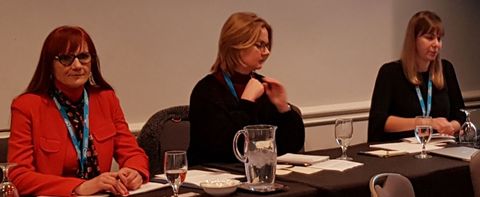| Newsletter / |
|
NISPAcee at the ASPA Annual Conference 2019 NISPAcee was represented at the ASPA Annual conference, which was held in Washington DC, on March 8 – 12, 2019, by Ľudmila Gajdošová, the NISPAcee Executive Director. She chaired the panel organized by NISPAcee on the theme: "Three decades of reform in the Central and Eastern Europe: What has been achieved?”  The panel was held on March 8, 2019 and three speakers presented their papers. The objective of the panel was to examine illustrative examples of reform efforts still underway in CEE. Allan Rosenbaum, Florida International University, Miami, US, presented a paper on the topic: To be or not to be: on the future of democratic reform in the CEE region. This paper briefly examined the state of political, administrative and economic reform in Central and Eastern Europe as it had developed over the course of the past three decades. It looked at the rise of varying degrees of anti-democratic regimes in the region and seeked to provide suggestions as to likely developments in the near future. Cristina M. Stanica, University of Delaware, US, presented a paper on the topic: A New Public Governance framework in Central and Eastern Europe. The presentation was based on the author’s dissertation research that studies New Public Governance in the Czech Republic, Romania, and Slovakia. It proposes a conceptual framework that looks into the influence of political culture and administrative context on co-production processes at local level in the three case study countries. Through the use of mixed-methods, the presentation presented results of a survey applied to local level municipalities and the analysis of expert interviews in relation to the creation of public value and serving the public interest, through bottom-up mechanisms of citizen participation. Veronica Junjan,University of Twente, Enschede, The Netherlands presented a paper on the topic: EU Monitoring instruments and measuring reform resilience. The case of Central and Eastern Europe. The paper focused on public sector reforms initiated in European Union both from the national (Member-State level), as well as part of the supra-national EU level where the latter were a two -step approach: first, the transposition of the EU legal provisions within the national legal framework, and then implementation within the national administrative system. EU monitoring instruments provide an image of the way that reforms were implemented across the years and can help in assessing the reform resilience. CEE represents a particularly interesting group of countries within the EU given the monitoring before and in some cases after the accession to the EU and the relative recency of the institutional reforms. Each presentation was followed by a reach discussion. Participants of the conference were extremely interested in the present status of reforms, possible developments and the EU influence. Panelists responded and sheared their views based on their research to the satisfaction of the interested participants. The open and knowledgeable discussion contributed to the overall success of the panel and underlined the vital role of education, training and researcher promoted by NISPAcee around its region. The recent developments within the NISPAcee region were in addition presented within a panel organized by Astana Civil Servise Hub focused on „Modern Trends and Challenges of Public Service in Post-Soviet and transition countries". Ľudmila Gajdošová participated in the panel as a discussant. |